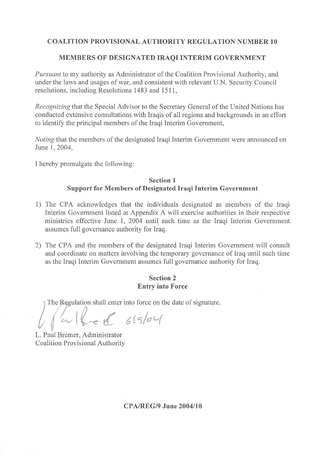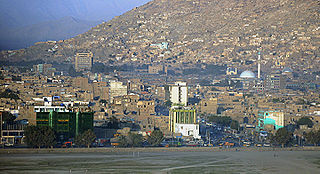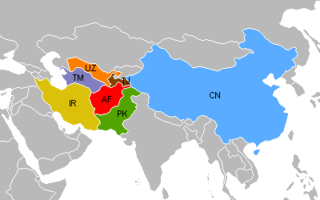
The United Nations Assistance Mission in Afghanistan is a UN Special Political Mission tasked with assisting the people of Afghanistan.

United Nations Security Council resolution 1546, adopted unanimously on 8 June 2004, after reaffirming previous resolutions on Iraq, the Council endorsed the formation of the Iraqi Interim Government, welcomed the end of the occupation and determined the status of the multinational force and its relationship with the Iraqi government.
Operation Accius is the Canadian military's contribution to the civilian-led United Nations Assistance Mission in Afghanistan (UNAMA). On November 28, 2002, the Minister of National Defence John McCallum announced that a senior Canadian Forces officer by the name of Lieutenant Colonel David Ross would be deployed to Afghanistan to serve as the military advisor to UNAMA.
United Nations Security Council Resolution 1746, adopted unanimously on March 23, 2007, after reaffirming all resolutions on the situation in Afghanistan, including resolutions 1659 (2006) and 1662 (2006), the Council extended the mandate of the United Nations Assistance Mission in Afghanistan (UNAMA) for an additional period of twelve months, until March 23, 2008.

United Nations Security Council Resolution 1917, adopted unanimously on March 22, 2010, after recalling its previous resolutions on Afghanistan, in particular resolutions 1868 (2009), 1662 (2006) and 1659 (2006), the Council extended the mandate of the United Nations Assistance Mission in Afghanistan (UNAMA) until March 23, 2011 and realigned its mandate to assist with government-led recovery efforts.

United Nations Security Council resolution 1378, adopted unanimously on 14 November 2001, after reaffirming all resolutions on the situation in Afghanistan, including resolutions 1267 (1999), 1333 (2000) and 1363 (2001), the Council affirmed that the United Nations would play an important role in the country and called for the establishment of a transitional administration leading to the formation of a new government.

United Nations Security Council resolution 1386, adopted unanimously on 20 December 2001, after reaffirming all resolutions on the situation in Afghanistan, particularly resolutions 1378 (2001) and 1383 (2001), the Council authorised the establishment of the International Security Assistance Force (ISAF) to assist the Afghan Interim Authority in the maintenance of security in Kabul and surrounding areas. It was the final Security Council resolution adopted in 2001.

United Nations Security Council resolution 1401, adopted unanimously on 28 March 2002, after recalling all previous resolutions on the situation in Afghanistan, including resolutions 1378 (2001), 1383 (2001) and 1386 (2001), the Council endorsed the establishment of the United Nations Assistance Mission in Afghanistan (UNAMA). It would replace the longstanding United Nations Special Mission to Afghanistan.

United Nations Security Council resolution 1453, adopted unanimously on 24 December 2002, after reaffirming all resolutions on the situation in Afghanistan, the Council endorsed the "Kabul Declaration on Good-Neighbourly Relations" signed by the Afghan government and six neighbouring countries on 22 December 2002.

United Nations Security Council resolution 1466, adopted unanimously on 14 March 2003, after reaffirming all resolutions on the situation between Eritrea and Ethiopia, particularly Resolution 1434 (2002), the council extended the mandate of the United Nations Mission in Ethiopia and Eritrea (UNMEE) until 15 September 2003.

United Nations Security Council resolution 1471, adopted unanimously on 28 March 2003, after reaffirming all resolutions on the situation in Afghanistan, the Council extended the mandate of the United Nations Assistance Mission in Afghanistan (UNAMA) for an additional period of twelve months until 28 March 2004.

United Nations Security Council resolution 1510, adopted unanimously on 13 October 2003, after reaffirming all resolutions on the situation in Afghanistan, particularly resolutions 1386 (2001), 1413 (2002) and 1444 (2002), and resolutions 1368 (2001) and 1373 (2001) on terrorism, the council extended the authorisation of the International Security Assistance Force (ISAF) for a period of one year and expanded its operations outside the capital Kabul to other areas.

United Nations Security Council resolution 1514, adopted unanimously on 13 November 2003, after reaffirming Resolution 1479 (2003) on the situation in Côte d'Ivoire and resolutions 1464 (2003) and 1498 (2003), extended the mandate of the United Nations Mission in Côte d'Ivoire (MINUCI) until 4 February 2004.

United Nations Security Council resolution 1528, adopted unanimously on 27 February 2004, after recalling resolutions 1464 (2003), 1479 (2003), 1498 (2003), 1514 (2003) and 1527 (2004) on the situation in Côte d'Ivoire, the council established the United Nations Operation in Côte d'Ivoire (UNOCI) for an initial period of twelve months.

United Nations Security Council resolution 1589, adopted unanimously on 24 March 2005, after reaffirming all resolutions on the situation in Afghanistan, particularly Resolution 1536 (2004), the council extended the mandate of the United Nations Assistance Mission in Afghanistan (UNAMA) for an additional period of twelve months until 24 March 2006.

United Nations Security Council resolution 1623, adopted unanimously on 13 September 2005, after reaffirming all resolutions on the situation in Afghanistan, particularly resolutions 1386 (2001), 1413 (2002), 1444 (2002), 1510 (2003) and 1563 (2004), and resolutions 1368 (2001) and 1373 (2001) on terrorism, the council extended the authorisation of the International Security Assistance Force (ISAF) until mid-October 2006.

United Nations Security Council Resolution 1974, adopted unanimously on March 22, 2011, after recalling previous resolutions on Afghanistan, in particular 1917 (2010), the Council extended the mandate of the United Nations Assistance Mission in Afghanistan (UNAMA) for a period of one year until March 23, 2012.

United Nations Security Council Resolution 1662, adopted unanimously on March 23, 2006, after reaffirming all resolutions on the situation in Afghanistan, including resolutions 1589 (2005) and 1659 (2006), the Council extended the mandate of the United Nations Assistance Mission in Afghanistan (UNAMA) for an additional period of twelve months.
United Nations Security Council Resolution 1868 was unanimously adopted on 23 March 2009.
United Nations Security Council Resolution 1806 was unanimously adopted on 20 March 2008.















